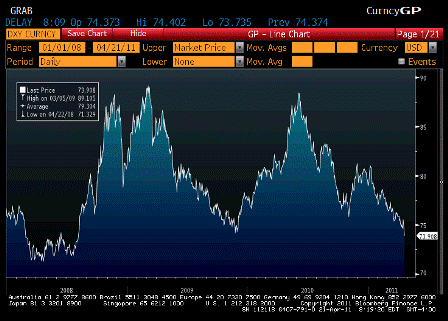So imagine the corn crop report comes out and it surprises on the upside at up 30%
What happens? The price of corn probably starts to fall. Commercial buyers back off, farmers rush to hedge, and, overall, players of all ilks try to reduce positions, get short, etc.
A few weeks later it’s further confirmed that the farmers are producing a massive bumper crop.
What happens? The same adjustments continue.
But what if that crop report was wrong? What if, in actual fact, there had been a crop failure? And market participants never do get that information?
What happens? Prices go down for a while as described above, but at some point they reverse, as sellers dry up, and as consumption overtakes actual supply price work their way higher, and then accelerate higher, even if no one ever actually figures out there was a crop failure.
QE is, in fact, a ‘crop failure’ for the dollar. The Fed’s shifting of securities out of the economy and replacing them with clearing balances removes interest income. And the lower rates from Fed policy also reduces interest paid to the economy by the US Treasury, which is a net payer of interest.
But the global markets mistakenly believed QE was producing a bumper crop for the dollar. They all believed, and some to the of panic, that the Fed was ‘printing money’ and flooding the world with dollars.
So what happened? The tripped overthemselves to rid them selves of dollars in every possible manner. Buying gold, silver, and the other commodities, buying stocks, selling dollars for most every other currency, selling tsy securities, etc. etc. etc. in what was, in most ways, all the same trade.
This went on for months, continually reinforced by the pervasive rhetoric that QE was ‘money printing’, and that the Fed was playing with fire and risking hyperinflation, with the US on the verge of suddenly/instantly becoming the next Greece and getting its funding cut off.
Not to mention Congress with it’s deficit reduction phobia.
So what’s happening now? While everyone still believes QE is a bumper crop phenomena, QE (and 0 rate policy in general) is none the less an ongoing crop failure, continuously removing $US net financial assets from the economy.
And so now that the speculators and portfolio shifters have run up prices of all they tripped over each other to buy, the anticipated growth in spending power-underlying aggregate demand growth needed to support those prices- isn’t there. And, to throw more water on the fire, the higher prices triggered supply side repsonse that have increased net supply along with a bit of ‘demand destruction’ as well.
Last week I suggested that higher crude prices were the last thing holding down the dollar, and that as crude started to fall I suggested its was all starting to reverse.
It’s now looking like it’s underway in earnest.


